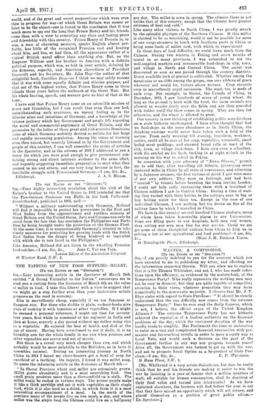THE TAPPING OF NEW FOOD SUPPLIES—MILLET. (To inc EDITOR Or
THE " SPECTATOR."' Sia,—Your interesting article in the Spectator of March 24th entitled "A. Grand Victualler to the Nation" encourages me to send you a cutting from the Scotsman of March 6th on the value of millet in food. I take this liberty with a view to suggest that we might go a step further even than your instructive article proposes on the road to economy.
Rice is marvellously cheap, especially if we use Japanese or Rangoon rice. For those who dislike it plain, cookery-books give ways of cooking it with tomatoes or other vegetables. If I might be excused a personal reference, I might say that for seventy- four years, first while in command of his regiment in India and then at tome, scarcely a day passed without my father using rice as a vegetable. He enjoyed the best of health and died at the age of ninety. Having been accustomed to use it daily, it is no hardship now for the whole family to use rico when potatoes and other vegetables are scarce and out of season.
But there is a cereal very much cheaper than rice, and which probably would be more palatable to the Britisher, as in taste it resembles oatmeal. During an interesting journey in North China in 1914 I found my chair-bearers got a bowl of soup for one-third of a farthing. On inquiry, I found it was millet soup. To quote the informing article in the Scotsman of March 6th :—
"In Shensi Province wheat and millet are extensively grown. Millet grows abundantly and is a most nourishing food. One titian grain produces more than a thousandfold on a stalk. The millet could be cooked in various ways. The poorer people make it like a thick porridge and eat it With vegetables as their staple food, while it is also used as a drink, in which form it is a most nourishing accompaniment of a meal. In the north of the province many of the people live on two meals a day, and where millet -was the staple food the Chinese could live on a halfpenny
per day. The millet is sown in spring. The climate there is not unlike that of this country, except that the Chinese have greater extremes of heat and cold."
Like many other visitors to North China, I was greatly struck by the splendid physique of the Northern Chinese. If this millet is claimed to be so nourishing, would it not be possible for some of our cargo steamers in touch with Northern ports in China to bring some loads of millet seed, with which to experiment?
In these days of food difficulty, we could learn much from the Chinese. During two winters in Peking and seven months of travel in as ninny provinces, I was astonished to see the well-supplied markets and innumerable food-shops in city, town, and village in North and Central China. The r,ecret was discovered as soon as one passed through the country districts. Every available inch of ground is cultivated. Whether among the mountains or on cliffs among the gorges, one sees ribbcns of green wherever soil would lie, terrace above terrace. Crop succeeds crop in marvellously rapid succession. The most, too, is made of each crop. For example, in Shensi, the Canada of China, in December, 1914, I saw hundreds of acres of young wheat. So long as the ground is hard with the frost, the farm animals are allowed to wander freely over the fields and are thus provided with fodder until the thaw comes in spring. They are then fed otherwise, and the wheat is allowed to grow.
Our country is now thinking of establishing public soup-kitchens on a scale hitherto unattempted. I have often thought that had we food-shops in the same abundance as in North China, the drinking customs would never have taken such a hold of the nation. From early morning till evening, travellers, workmen, coolies, could all be sure of hot soup, vegetables, vermicelli, small boiled meat puddings, and steamed bread rolls at most of the city, town, or village food-shops. I have seen even a schoolboy, with his satchel on his back, tucking in at eight o'clock in the morning on his way to school in Peking.
In connexion with your advocacy of "Down Glasses," permit me to add that, after travelling vid Siberia, journeying seven thousand miles in China, by all sorts of conveyance, and returning by a Japanese steamer, the first victims of drink I saw were some of our own soldiers. They were on furlough, and had been " treated" by friends before boarding the train leaving London. I could not help sadly contrasting them with a. trainload of Chinese soldiers I saw in Central China. During a time of wait- ing they rushed with their kettles to the cottages near to beg or buy boiling water for their tea. Except in the case of one individual Chinese, I saw nothing but tea drunk on five of the railway lines by which I travelled in China.
We have in this country several hundred Chinese students, many of whom have taken honourable places in our Universities. Some are filling posts in our hospitals, both men and women, thus setting our own men free for war service. Could we not get some of these thoughtful visitors from China to help us in solving a few of our agricultural and food problems?—I am, Sir,


































 Previous page
Previous page